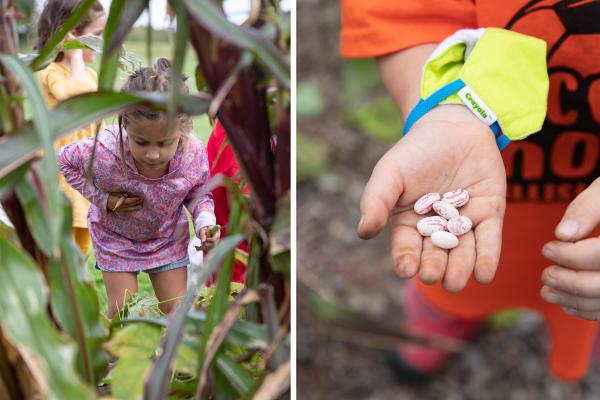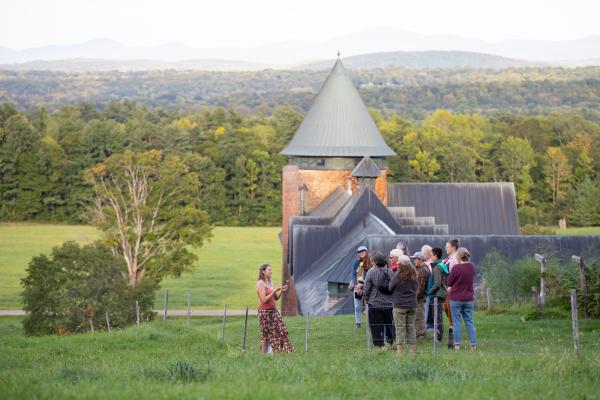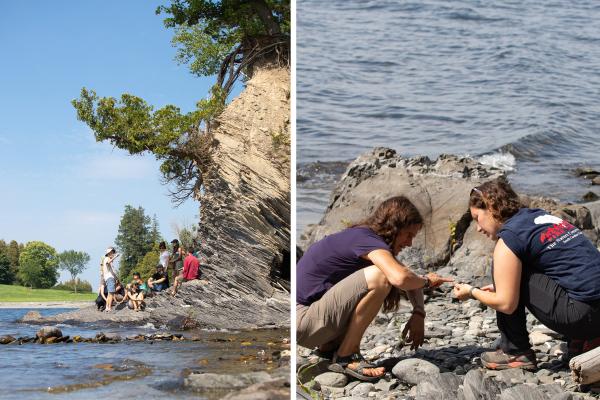Even for someone who is visiting Shelburne Farms for the first time, they come to realize that -all of Nature- is its educational campus.
A Campus for Learning
You might only know Shelburne Farms as home to scenic walking trails or award-winning cheese. In this new blog series, we’re highlighting a deeper dimension of the organization that is central to our mission: Shelburne Farms as a campus for learning, the ways all ages — from preschoolers to college students to professional educators — explore the natural landscape, learn from our staff and other experts, and engage with the big ideas of sustainability. Read on to discover a few of these stories.
Adventures Early Childhood Program
On a recent rainy Wednesday, a dozen preschoolers and their families trekked up the hill behind the Farm Barn to a surprise. Under the leafy green canopy was an outdoor classroom: one table filled with books, another with bouquets of flowers and watercoloring supplies. But the classroom was, really, all around.
As part of the eight-week Adventures Program, preschoolers are immersed in the outdoors to connect with food, nature, and agriculture through play. They spend their days exploring the forest, meeting animals in the farmyard, taking inventory of the goods in the garden and, of course, asking questions about whatever catches their attention, like chipmunks scurrying across the wood chips or falling autumn leaves.
“When I go out into the natural world with a group of kids, it’s a reminder about pace,” Early Childhood Program Coordinator Jed Norris told NBC5 in a recent interview. “The autonomy that kids get from filling their own water buckets and gathering soil. . . here is a space we can make that happen and kids can kind of have that freedom.”
Spoonful Herbals
“Shelburne Farms is a green space that is organically managed so we can trust that the medicine is clean,” shares Katherine Elmer of Spoonful Herbals. “We find that the plants are really thriving here, so it is a great way to introduce plants to students.”
Spoonful Herbals, founded and led by Herbalists Kara Buchanan and Katherine Elmer, is a nonprofit organization sharing hands-on education about the traditional herbal medicines found all around our local landscape. Throughout the year, they hold workshops on our farm campus on plant identification and how to turn a wildcrafted harvest into beneficial preparations (such as syrups, bitters, and vinegar-based shrubs).
“These outdoor spaces have been so important to us during COVID,” says Kara. “Of course, we’re always focused on outdoor spaces, but even more so now. The ability for people to have a way to get out of the city, spread out, and be somewhere like this has been very transformative.”
“Even though Burlington is a small city,” Katherine continues, “there are a lot of places where the land has been polluted to the point where the medicines aren’t safe. Shelburne Farms is an amazing resource for green, clean medicine that we can bring back to the city and distribute through mutual aid efforts. For instance, we donated a lot of medicines to the Wabanaki community in Maine that was really struggling with COVID last year, including a lot of medicines that were harvested from Shelburne Farms. So not only is this place an outdoor classroom, but an important resource for the work we do.”
You can find upcoming workshops with Spoonful Herbals on our calendar, including Fire Cider Preparation on October 19 (registration required).
UVM Field Naturalist Program
To earn their master’s degrees, students in the UVM Field Naturalist program learn to uncover and share all the geological, ecological, and human stories layered and linked in the landscape. There’s really no better place to launch that journey than at Shelburne Farms, and this year, that’s exactly what they did. Ahead of formal classes, the new cohort of Field Naturalists gathered for a weekend retreat, led by core program staff. Lakeside, they traced the geological history of the area recorded in the cliffs. In the woods, they crouched low to examine herbaceous plants in an introduction to field botany. Across the campus, they explored what the underlying ecology supports: pastures, gardens, a sugarbush, and more--systems that in turn support humans.
“Shelburne Farms is an incredible resource for the UVM community, and especially for the Field Naturalist program,” said the program’s co-Director Walter Poleman, “It’s such a great example of developing relationships with the land to sustain both the human community and the full diversity of other organisms.”
The Field Naturalist Program is one of many UVM programs and classes that regularly visit and take advantage of the living classroom at Shelburne Farms. We are happy to support the learning.
See more opportunities to learn and view all upcoming events.


